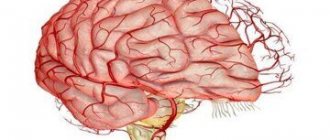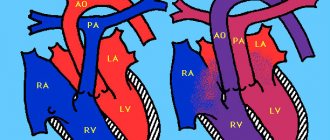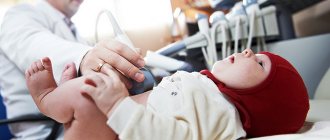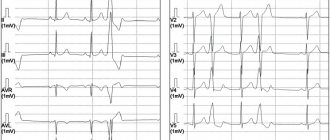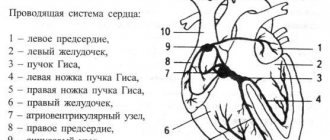- home
- Helpful information
- Mental illness
- Vascular dementia
Vascular dementia is a disease associated with impaired brain activity. Often the pathology is directly related to a stroke, which leads to damage to the blood vessels of the head. As a result, the patient's cognitive abilities decrease. Thinking becomes illogical, memories begin to disappear, speech becomes meaningless, and the ability to navigate in time and space is lost. The man loses his mind. This process usually lasts 6-8 months. But sometimes an acute form of dementia occurs immediately after a stroke.
Sign up for a consultation
Why does vascular dementia develop?
The mechanism of development of vascular dementia is based on the death of brain cells due to circulatory disorders. This may be a chronic pathology or an acute cerebrovascular accident (stroke).
Strokes can be of two types: ischemic and hemorrhagic. An ischemic stroke occurs when large blood vessels in the brain are blocked by blood clots or emboli. This condition usually develops against the background of atherosclerotic processes, due to pathologies of cerebral vessels, heart attacks, arrhythmias and other diseases.
In a hemorrhagic stroke, there is bleeding in the brain. This can happen because a blood vessel ruptures or the wall is damaged, allowing blood to leak through. Such conditions occur against the background of high blood pressure (hypertensive crises are especially dangerous), inflammation, poisoning and intoxication, and atherosclerotic changes.
If a significant proportion of neurons die as a result of a stroke, symptoms of dementia develop in a short time and are accompanied by pronounced symptoms, which depend on which part of the brain is affected.
Chronic vascular dementia develops gradually and is caused by impaired circulation in small blood vessels. As in the case of a stroke, the prerequisite for this is atherosclerosis, arterial hypertension, diabetes mellitus, cardiovascular failure, etc. At the initial stages, compensation occurs, and problems can be invisible for a long time, both for the patient himself and for his loved ones .
Treatment and rehabilitation
There is no universal approach to the treatment of vascular dementia. The medical community still does not have a consensus on the causes of the disease. Considering that the disease manifests itself in the form of several obvious symptoms, a differentiated approach is used, which includes taking measures aimed at:
- preventing (or slowing down) disease progression;
- removal (or reduction) of cognitive symptoms responsible for quality of life;
- therapeutic recovery.
In case of problems with small vessels of the brain, doctors at the Panacea clinic first of all try to normalize blood pressure. At the same time, its excessive decrease can lead to a decrease in mnestic-intellectual functions. To prevent cerebral infarctions, patients are prescribed antiplatelet agents—medicines that prevent platelets from sticking together. They are given along with anticoagulants to patients with vascular dementia to prevent embolism. Doctors try to solve cognitive problems (or alleviate their intensity) with the help of:
- nootropics;
- cerebrolysin and its analogues;
- calcium channel antagonists.
The response to treatment is individual for each patient with vascular dementia. If indicated, drug therapy should be reconsidered. This is done in order to reduce the toxic effects of drugs on the body. Also, such patients need prevention of aspiration, urinary and respiratory infections. Hygiene procedures are important.
Order a visit from a gerontologist. Experienced doctors. Treatment in a hospital or at home. 24-hour service in Moscow and the region. Professional, anonymous, safe.
- Online consultations about dementia
- Factors that provoke dementia
- Dementia with Lewy bodies
- Psychoses in old age
- Age-related personality changes
- Treatment of depression in the elderly
- Is it possible to stop senile dementia?
- Treatment of senile dementia
- Dementia treatment
- Symptoms of Alzheimer's disease
- Drug therapy for patients with dementia
- Diagnosis of dementia
- Manifestation of Alzheimer's disease
- Types of dementia
- Parkinson's disease
- Hallucinations and delusions
- Vascular dementia
- Psychodiagnostics of elderly patients
- Treatment options for Parkinson's disease
- Early diagnosis of mental disorders in older people
- Senile aggression: why does it occur, what to do with it?
- Alcoholic dementia
- Alcoholism in old age
- Mental disorders in old age
- Pick's disease
- Risk factors for dementia
- Differential diagnosis for Alzheimer's disease
- Behavioral and mental disorders in dementia
Symptoms of vascular dementia
Symptoms can be quite varied, depending on which part of the brain is affected. But there are a number of common manifestations that are presumably associated with dysfunction of the white matter of the brain:
- planning violation. The patient has difficulty choosing a goal, drawing up a plan to achieve it, and is unable to adjust his actions if circumstances change;
- cognitive activity decreases. It is difficult for such people to learn new information or new movements (for example, when learning any sports). At the same time, difficulties are observed precisely when trying to independently produce something new, for example, using a new word. But if the patient is asked to choose the correct option, he successfully copes with this task;
- visual-spatial dysgnosis is a set of symptoms characterized by impaired perception of space and oneself in it. It manifests itself in a variety of symptoms, from difficulties with drawing or design to the inability to navigate in space and recognize one’s own body parts. It is often difficult to determine right and left.
The degree of progression of vascular dementia depends on the disease against which it develops. For example, with strokes, dementia develops within a month after the disaster; less often, a delayed onset occurs. With multiple strokes, this period is longer.
More often, vascular dementia has a step-like course, when cognitive functions deteriorate and temporary stabilization occurs at this level. Some patients may even experience some recovery during this stable period. But after some time the situation worsens again.
As dementia progresses, memory decreases, speech disorders, and impairments in counting and writing are noted. Patients forget words, their speech becomes more scarce, they themselves understand worse the conversations of others and the meaning of speech addressed to them.
There is also a loss of self-care skills, and thinking slows down. Patients find it difficult to navigate in space and concentrate. It is difficult for them to carry out everyday activities - shopping, cleaning the house, paying bills, preparing food, etc. The emotional sphere also suffers. Tearfulness, irritability, and distrust are noted. Possible development of depression or psychosis.
Along with the impairment of cognitive functions, neurological symptoms are observed, for example, numbness of the limbs, paralysis, impaired reflexes, impaired control of the function of the pelvic organs, unsteadiness of gait, etc.
Dementia atherosclerotic, senile
Dementia
- translated from Lat. dementia means insanity - a serious disease caused by organic damage to the brain, expressed in a sharp decrease in mental abilities, collapse of mental functions, irreversible loss of acquired knowledge and skills, decreased ability to self-care, persistent decrease in the speed of mental reactions, impoverishment of emotions, impaired emotional control, motivation and social behavior.
The clinical picture of dementia is characterized by the causes that caused organic brain damage, the localization and extent of the defect, and the initial state of the body. But in all cases of the disease, memory impairment, attention disorders, decreased thinking and learning abilities, and loss of basic skills are characteristic. Dementia is an irreversible degenerative disease, and at a young age its development occurs as a result of addictive behavior from addictions - alcohol addiction. Senile dementia - translated from Latin. senilis means senile - is colloquially called senile marasmus and develops in people after 65 years of age.
According to WHO, there are more than 47 million people with dementia in the world and more than 7 million new cases of the disease are registered annually.
Get a free consultation by phone
Treatment of vascular dementia
Treatment of this pathology is complex, and first of all it is aimed at eliminating vascular pathology:
- normalization of pressure;
- normalization of blood sugar;
- combating the phenomena of atherosclerosis;
- in case of severe narrowing of the arteries, surgical treatment (stenting) is possible.
In parallel with this, therapy is carried out to preserve cognitive functions. Both medications and cognitive training are used. At common stages, care and household safety come first.
Diagnostics
The diagnosis of dementia is established according to clear criteria:
1. The presence of signs of impairment of short-term and long-term memory, which are identified on the basis of subjective data from a survey of the patient and his relatives, they are supplemented by objective studies.
2. The presence of at least one disorder characteristic of organic dementia from the list below:
- Decreased ability for abstract thinking.
- Impaired criticality of perception (discovered when making real plans for the near future in relation to oneself and others).
- The presence of neuropsychological symptoms and syndromes: “three A” - aphasia - speech impairment;
apraxia – difficulty performing purposeful actions; agnosia – disturbance of perception, with preserved consciousness and sensitivity; as well as a violation of optical-spatial functions and constructive activity.
- Personal changes: irritability, rudeness, unmotivated aggression, disappearance of the sense of duty and shame.
3. Social maladjustment at work and in the family.
4. There are no manifestations of delirium (Latin delirium - delirium, madness), changes in consciousness at the time of diagnosis (the patient has no signs of hallucinations, he can navigate in time and space, as far as his condition allows him).
5. An organic defect was determined based on the results of research and analysis.
To establish a reliable diagnosis, it is necessary to monitor the patient and the presence of the above symptoms for 6 months.
There are diseases and conditions with symptoms reminiscent of dementia: memory is reduced, concentration is impaired, there is a speech disorder, and adaptation to everyday social life is difficult. This condition can appear as a defensive reaction to a stressful situation, a state of shock, and severe depression. Violations in such cases are always reversible. Organic dementia is usually a degenerative irreversible disease.
Long-term observation of the patient will guarantee a correct diagnosis.
Get a free consultation by phone
Stages of dementia development
Dementia tends to progress. Experts identify the following stages of dementia in the elderly:
- Easy. The duration of the stage is 3 years from the moment the first symptoms appear. Practical skills and abilities are not affected. There are learning difficulties and memory lapses. However, the patient is able to care for himself independently.
- Moderate. Lasts up to 2.5 years. Loss of acquired life skills begins to occur. Mental abilities become dull. Classic household manipulations cause difficulties. The patient needs the care of loved ones.
- Heavy. The duration of the period is up to 3.5-5 years. The last stage of dementia is caused by the breakdown of personality. A person is not able to live without outside help.
It is impossible to determine exactly how long the stages last. The course of the disease is individual. It is important to notice the manifestation of dementia in time and organize proper care for a patient with dementia. This will slow down the progression of the disease. Full recovery is impossible.
Disease prevention
Of course, it is easier to prevent any disease than to treat it later, dementia is no exception. Measures to prevent dementia are:
- Controlling blood sugar and cholesterol levels, monitoring blood pressure and preventing its serious increase. Any serious interruptions in the functioning of the body can become a trigger for this serious disease.
- Complete cessation of bad habits. Smoking and alcohol addiction can cause a stroke or heart attack, which, in turn, can trigger dementia.
- Regular feasible physical exercise and walks in the fresh air. They stimulate blood flow to all organs, which not only improves overall well-being, but also improves mood.
- Balanced healthy diet. It is advisable to give preference to foods such as vegetables, fruits, fish, cereals, nuts, while simultaneously eliminating (or seriously reducing) the consumption of smoked meats, marinades, and other not very healthy foods.
- Communication. It is important to maintain the same social circle and not withdraw into yourself. Self-sufficiency is good if it is in moderation.
Symptoms of age-related depression
The older the age group, the more often depression and dementia (senile insanity) are registered in it. Often elderly patients at our clinic complain of the following symptoms:
- Negative view of objects and events in life. An elderly man expresses dissatisfaction with youth, authorities, and the weather. Everything that was before is good, and everything that is now is bad.
- Constant grievances , especially against loved ones, a feeling of “damage done . An elderly family member unreasonably reproaches his loved ones that everyone has abandoned him, they want to take something away from him, they don’t love him, and no one needs him, that they are plotting something against him and want to harm him. This is not behavioral egoism or “harmfulness of character” - but a symptom of vascular disease of the brain (dementia or senile insanity).
- Impaired ability for integrative brain functions - recall, memorization, thinking. More often, memory for recent events suffers, while events that happened many years ago are remembered well.
- Cardiovascular attacks due to the slightest stress. A small stimulus is perceived as large, and the released stress hormones “hit” the blood vessels, hence a disruption of the heart rhythm, a hypertensive crisis or a heart attack.
- Pain in the back, joints, legs, head. Against the background of depression, the pain threshold always decreases and minor pains from arthrosis and osteochondrosis are perceived more clearly.
If you see such symptoms, seek help from a neurologist or psychiatrist. Perhaps brain cells die daily and in large numbers, and it is dangerous to wait. At the same time, if you start treatment in time, its results can be very noticeable. We often see cases of rapid, within 1-2 months, transformation of older people into energetic, positive, active and internally young people. Blood pressure and heart behavior are much calmer.
Three stages of the disease
Dementia never occurs overnight or over a short period of time: it develops gradually, worsening in stages over several years. Three stages of development of the disease are known:
- light;
- moderate;
- heavy.
Let's talk about each of them in more detail.
Light (early)
The disease is practically invisible, the patient is no different from the healthy one. Some absurdities in the behavior of an elderly person are often associated with age-related changes and are called senile eccentricities, without particularly focusing on them. But it would be necessary.
Early stage symptoms:
- decreased performance;
- loss of interest in past interests and hobbies;
- development of excessive traditionalism;
- denial of everything new, nostalgia for the past;
- memory impairment (especially short-term);
- problems with attention: either excessive concentration, or vice versa, a serious decrease in attentiveness;
- touchiness, isolation, against this background - irritability, often turning into aggressiveness;
- restriction of physical activity.
Often, along with the listed symptoms, old people begin to confuse objects and things, lose them, forget them, put them in the most unexpected places, and then search for them for a long time and unsuccessfully. For example, after the potatoes are peeled, the knife will be put in the refrigerator, and the peeled tubers will be thrown into the trash.
At the same time, an elderly person is still adequate, can take care of himself, and is oriented in both time and space.
Moderate
The disease is gradually gaining momentum:
- Memory lapses are more frequent and more severe. But, as before, events that happened recently are forgotten, but he remembers what happened to the patient in childhood and youth in the smallest detail.
- The forgotten is replaced by something invented, imagined or imagined. Often, a pensioner’s fantasies look so believable that many believe his stories, especially since fictional events, most often, are closely intertwined with real ones that actually happened.
- Walking alone becomes dangerous for the patient: he may forget not only his address, but also the way home. There are often cases when older people manage to get lost just by turning the corner of their house.
- Patients lose control over the simplest everyday situations: they forget to turn off the kettle or, even worse, they open the gas burner, forgetting to light the gas, or they may not close the door in the apartment.
- Speech is simplified, a person conducts a dialogue with short, simple phrases such as “give me a drink”, “I won’t”, “I want to go for a walk”, etc.
- The ability to dress and put on shoes independently is gradually lost, the patient forgets how to use a knife and fork, and problems with hygiene begin.
- The character deteriorates completely, mental degradation sets in.
The physical condition of an elderly person also leaves much to be desired: the gait changes seriously, muscles weaken, hands tremble, and sometimes it is difficult for the patient to even bring a spoon or mug to his mouth.
Severe (late)
There comes complete degradation of personality and loss of all acquired skills. He cannot eat or drink on his own, any hygiene procedures are also inaccessible to him, and he does not even remember them.
An elderly person loses activity, but sometimes sharp emotional outbursts occur, dangerous both for those around him and for the patient himself. Complete social disadaptation sets in, and the person gradually fades away.


